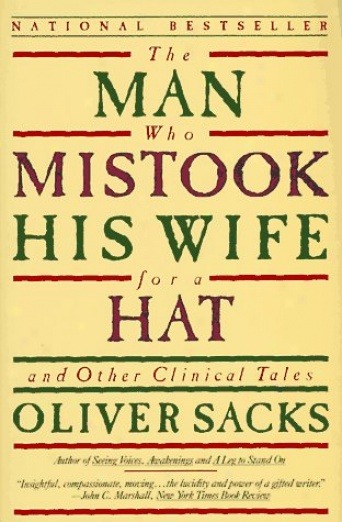The Man Who Mistook His Wife For A Hat Monday, October 01, 2012 ( 11:11 pm )
 Assalamu'alaikum. Hi there. Long time no see. Wait, what's this right here? This is The Man Who Mistook His Wife For A Hat. Quite a weird title for a book, don't you think? Weird, yet interesting. I've been longing to get my hands on this ever since I started studying Neuropsychology last semester. The book was mentioned in my textbook, and I just smiled and thought to myself, "I have to have this". It's related to neurological conditions, hence very beneficial to my studies. Hopefully, it would help me to understand and remember better on the conditions mentioned in the book. Unfortunately, I can only manage to find it at MPH bookstores but according to MPHOnline.com, it is currently out of stock. Hmm. :( I know there are free PDF versions of this book online, but I don't want to read the E-book version because... I like feeling the textures of the pages of a book and the sound produced when turning each page. There you go. The book is written by Dr. Oliver Sacks. He is a neurologist, a best-selling author, and a professor of neurology at the NYU School of Medicine. He is best known for his collections of neurological case histories, including the book mentioned, The Man who Mistook his Wife for a Hat (1985), Musicophilia: Tales of Music and the Brain (2007) and The Mind’s Eye (2010). Awakenings (1973), his book about a group of patients who had survived the great encephalitis lethargica epidemic of the early twentieth century, inspired the 1990 Academy Award-nominated feature film starring Robert De Niro and Robin Williams. The New York Times has referred to him as “the poet laureate of medicine.” Dr. Sacks is a frequent contributor to the New Yorker and the New York Review of Books, and a fellow of the American Academy of Arts and Letters as well as the American Academy of Arts and Sciences. In 1977, Dr. Sacks met Greg F., the patient on whom the character of Gabriel Sawyer is based. Greg, a young man with devastating amnesia caused by a brain tumor, could remember no new events in his life, but his memory for music, particularly that of his beloved bands of the 1960s, remained intact. Music could reach him as nothing else could. After almost fifteen years of working with Greg, Dr. Sacks arranged for Greg to meet drummer Mickey Hart and go to a Grateful Dead concert. Dr. Sacks wrote about Greg and the Grateful Dead in “The Last Hippie,” a chapter in his book An Anthropologist on Mars. The Last Hippie has inspired the indie feature film, The Music Never Stopped. The film features music from the Grateful Dead, the Beatles, Bob Dylan, the Rolling Stones and Crosby, Stills and Nash. It was chosen as the gala premiere film for the Sundance Festival. Seems like THE perfect movie for me. I mean, just look at the music featured, and the storyline. As an occupational therapy student and a true fan of music(especially The Beatles), gotta love this one. Hopefully I would get a chance to watch this movie one day, insyaAllah. According to Dr. Sacks, “the film is a moving testament not only to the love between a father and his son, but to the miraculous power of music to heal a damaged brain. Remembering music, listening to it or playing it, is entirely in the present, and, while it lasts, it can bridge even the abyss of extreme amnesia or dementia. Music can be more powerful than any drugs.” MUSIC CAN BE MORE POWERFUL THAN ANY DRUGS. I knew it! And thus, it is why I've dreamed to be a music therapist one day, ever since I was 14. Because I believe that music is more than just entertainment to the eardrums. Music is like food to the soul, a personal motivator, a medium of managing stress, etc etc etc. Music has been proven to help many people and it is a form of therapy. I'm pretty sure everyone loves music! Except for.. a few odd ones. Dr. Sacks writes more about music and music therapy in his book MUSICOPHILIA, including this passage from the preface: While music can affect all of us—calm us, animate us, comfort us, thrill us, or serve to organize and synchronize us at work or play—it may be especially powerful and have great therapeutic potential for patients with a variety of neurological conditions. Such people may respond powerfully and specifically to music (and, sometimes, to little else). Some of these patients have widespread cortical problems, whether from strokes or Alzheimer’s or other causes of dementia; others have specific cortical syndromes— loss of language or movement functions, amnesias, or frontal-lobe syndromes. Some are retarded, some autistic; others have subcortical syndromes such as parkinsonism or other movement disorders. All of these conditions and many others can potentially respond to music and music therapy. Somehow I feel slightly offended, when people say that music is just a waste of time, and can do absolutely NO GOOD at all, especially to one's future. BUT YOU'RE WRONG. There are many successful people out there, and music has helped them to succeed. And that has probably happened whilst you sad, odd people were busy underestimating the power of music. Yes, to some, music drifts them away. But to many, music helps them in many ways. Nevertheless, it is only an opinion. Everyone has theirs, and everyone believes in what they want to believe in. I just hope it's all good stuff. If you know what I mean. Take a moment to appreciate the things you've never thought of appreciating. Because the little things are what makes the big things, BIG. Yes, you're right, there are other, and most probably better things out there compared to music. But music is apart of something real. Use it for the right reasons. Don't use it for the wrong ones. Even in anything we do or see, take the good and leave out the bad stuff. Like eating a burger from McDonalds. Maybe some of you don't like the pickles in a doublecheese burger(like me for instance), so all you have to do is pick out the pickles and put it aside and just nom away and enjoy the burger! Bak kata pepatah, "buang yang keruh, ambil yang jernih". So go! Go appreciate the good stuff in life. Give your mum a hug, kiss your wife on the forehead before going off to work, give your little brother/sister a congratulations pat for doing well on his/her maths test, tell someone you love them, and the list goes on... It would be nice if I could collect all of Dr. Sacks' writings. It would be even better if I could meet him in person! You never know what Allah has installed for you. ;) Til then. Perhaps I'll check out the latest from J.K Rowling, The Casual Vacancy. Toodles. Labels: books 0 comments  
© 2006-2011 The Real Life. All rights reserved. *Best viewed in Chrome (1280 x 800 pixels) |













